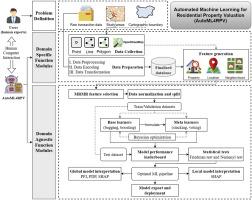Automated machine learning for residential property valuation
IF 8
2区 计算机科学
Q1 AUTOMATION & CONTROL SYSTEMS
Engineering Applications of Artificial Intelligence
Pub Date : 2025-08-22
DOI:10.1016/j.engappai.2025.112035
引用次数: 0
Abstract
Many studies have demonstrated that machine learning (ML) models surpass other approaches in residential property valuation. However, developing well-performing ML models requires the deep involvement of domain experts and data scientists, posing challenges for the scale of artificial intelligence (AI) implementation and application. Automated ML (AutoML) implements the end-to-end process of repetitive ML tasks without much human assistance. Although existing AutoML techniques have yielded promising results, no domain-specific AutoML framework is designed for residential property valuation. Most AutoML frameworks are domain-agnostic, overlooking domain knowledge, which limits their model performance and the practical applications of AI in real-world scenarios. This study proposes a domain-specific AutoML framework for residential property valuation (AutoML4RPV), which incorporates both domain-specific and domain-agnostic function modules to streamline AI implementation. Three real housing transaction datasets (New York, London, and Singapore) and a public valuation dataset are used for experimental validation by comparing AutoML4RPV with benchmark ML models and openly available AutoML frameworks. Integrating domain-specific modules, AutoML4RPV achieves the best performance with raw data input, outperforming the second-ranked domain-agnostic AutoML framework by 17.6 %, 18.2 %, and 9.80 % for the New York, London, and Singapore datasets, respectively. The domain-agnostic modules of AutoML4RPV are highly competitive and achieve the best model performance for the public valuation dataset. The data and codes of AutoML4RPV are openly available at https://github.com/Linhkust/AutoML4RPV.

住宅物业估值的自动机器学习
许多研究表明,机器学习(ML)模型在住宅物业估值方面优于其他方法。然而,开发性能良好的机器学习模型需要领域专家和数据科学家的深入参与,这对人工智能(AI)的实施和应用的规模提出了挑战。自动化机器学习(AutoML)实现重复机器学习任务的端到端流程,而无需太多人工帮助。尽管现有的AutoML技术已经产生了有希望的结果,但没有为住宅物业评估设计特定领域的AutoML框架。大多数AutoML框架都是领域不可知的,忽略了领域知识,这限制了它们的模型性能和AI在现实场景中的实际应用。本研究提出了一个特定领域的住宅物业评估自动化框架(AutoML4RPV),该框架结合了特定领域和不可知领域的功能模块,以简化人工智能的实现。通过将AutoML4RPV与基准ML模型和公开可用的AutoML框架进行比较,使用三个真实的住房交易数据集(纽约、伦敦和新加坡)和一个公共估值数据集进行实验验证。集成了特定于领域的模块,AutoML4RPV在原始数据输入方面达到了最佳性能,在纽约、伦敦和新加坡数据集上分别比排名第二的领域无关的AutoML框架高出17.6%、18.2%和9.80%。AutoML4RPV的领域不可知模块具有很强的竞争力,并且在公共评估数据集上实现了最佳的模型性能。AutoML4RPV的数据和代码可在https://github.com/Linhkust/AutoML4RPV上公开获取。
本文章由计算机程序翻译,如有差异,请以英文原文为准。
求助全文
约1分钟内获得全文
求助全文
来源期刊

Engineering Applications of Artificial Intelligence
工程技术-工程:电子与电气
CiteScore
9.60
自引率
10.00%
发文量
505
审稿时长
68 days
期刊介绍:
Artificial Intelligence (AI) is pivotal in driving the fourth industrial revolution, witnessing remarkable advancements across various machine learning methodologies. AI techniques have become indispensable tools for practicing engineers, enabling them to tackle previously insurmountable challenges. Engineering Applications of Artificial Intelligence serves as a global platform for the swift dissemination of research elucidating the practical application of AI methods across all engineering disciplines. Submitted papers are expected to present novel aspects of AI utilized in real-world engineering applications, validated using publicly available datasets to ensure the replicability of research outcomes. Join us in exploring the transformative potential of AI in engineering.
 求助内容:
求助内容: 应助结果提醒方式:
应助结果提醒方式:


